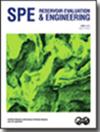巴基斯坦北部Potwar盆地深致密碳酸盐岩储层叠前地震方位各向异性反演
IF 1.5
4区 工程技术
Q3 ENERGY & FUELS
引用次数: 0
摘要
深层、致密和非均质储层的定量表征对于确定油气通道、实现油藏有效优化开发具有重要意义。在本例研究中,我们使用方位叠前地震各向异性反演方法来估计由一组垂直裂缝、定向裂缝和应力引起的水平横向各向同性(HTI)属性。各向异性反演有助于将界面性质转化为相应的层基性质,从而定量解释与地震振幅方位角变化相关的储层性质。为了估计HTI介质的各向异性量级和各向同性轴线方向,将叠前地震反演(采用6方位角× 4角度叠加)得到的弹性特性(p -阻抗和Vp/Vs)作为输入。各向同性低频模型(LFM)作为所有方位角反演的基础,然后通过沿方位角更新模型来加入各向异性效应。各向异性反演得到的各向同性平面的方向是用最大水平应力作为先验约束来确定的,这消除了任何固有的不确定性。该工作流程有效地描述了巴基斯坦北部Potwar盆地新近发现的古新世(Lockhart)地层油藏的裂缝方向和密度。这也有助于提高研究区裂缝预测的准确性。根据致密碳酸盐岩(Lockhart)储层勘探井(D1)的观察(裂缝),观察到大量的各向异性量级。这为油气勘探、油田开发和可靠的钻井决策提供了依据。本文章由计算机程序翻译,如有差异,请以英文原文为准。
Azimuthal Prestack Seismic Anisotropic Inversion on a Deep and Tight Carbonate Reservoir From the North Potwar Basin of Pakistan
Quantitative characterization of deep, tight, and heterogeneous reservoirs plays an important role in identifying hydrocarbon pathways for effective and optimal reservoir field development. In this case study, we used an azimuthal prestack seismic anisotropic inversion approach to estimate attributes of horizontal transverse isotropy (HTI) caused by a set of vertical fractures, oriented cracks, and stress. Anisotropic inversion facilitated the conversion of interface properties to the corresponding layer-based properties, which led to the quantitative interpretation of reservoir properties related to azimuthal variation in seismic amplitudes. To estimate the anisotropy magnitude and the direction of the isotropy axis in HTI media, elastic properties (P-impedance and Vp/Vs) obtained from prestack seismic inversion (using six azimuth × four angle stack) served as inputs. The isotropic low-frequency model (LFM) is used as the foundation of the inversion for all azimuths, and the anisotropy effects are later added by updating the model along the azimuths. The direction of the isotropy plane resulting from the anisotropic inversion is determined by using the maximum horizontal stress as a prior constraint, which eliminates any inherent uncertainty. The workflow used effectively characterized the orientation and density of fractures from the recently discovered oilfield reservoirs of the Paleocene (Lockhart) formation located in Pakistan’s north Potwar Basin. It also helped improve the prediction accuracy for fractures in the study area. According to the observations (fractures) from the exploratory drilled well (D1) in the tight carbonate (Lockhart) reservoir, a significant amount of anisotropy magnitude is observed. This provides the basis for hydrocarbon exploration, field development, and reliable drilling decisions.
求助全文
通过发布文献求助,成功后即可免费获取论文全文。
去求助
来源期刊
CiteScore
5.30
自引率
0.00%
发文量
68
审稿时长
12 months
期刊介绍:
Covers the application of a wide range of topics, including reservoir characterization, geology and geophysics, core analysis, well logging, well testing, reservoir management, enhanced oil recovery, fluid mechanics, performance prediction, reservoir simulation, digital energy, uncertainty/risk assessment, information management, resource and reserve evaluation, portfolio/asset management, project valuation, and petroleum economics.

 求助内容:
求助内容: 应助结果提醒方式:
应助结果提醒方式:


